
Fresh Water at Sea Page Menu: 1 2 3 4 5 6 7 8 9 <<First
Fresh Water at Sea in the Golden Age of Piracy, Page 9
Fresh Water and Health
Fresh water was important for the health and well being of every man on a ship. With this in mind, let's take a a brief look at the nature of that relationship as viewed by the authors during this period. First the type of water sources that authors did and didn't recommended as healthy are examined. Next, some ways in which contemporary authors used water in healing are considered. Finally, the connection between drinking water and illness is discussed.
Fresh Water and Health - Preferred Water Sources
The connection between fresh, potable water and health has long been recognized. The revered physician Hippocrates wrote about the link as early as 400BC. Since Hippocrates' works were still considered relevant to medicine during the golden age of piracy, this link would have been recognized by many of medical professionals during this period.
Hippocrates suggested that the best water for health was rain water. He said that it was "the lightest, the sweetest, the thinnest, and the clearest"1. He felt that
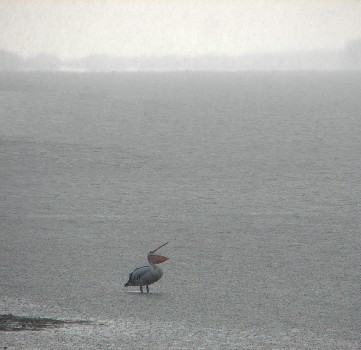
Photo: Louise Docker (aussiegal)
this was because the sun drew the water up from the seas, lakes and even man himself via sweat, leaving behind unwanted impurities, particularly mentioning salt. Hippocrates elsewhere links sweetness and saltiness to humor theory and the need for their balance in the body. When discussing food, Hippocrates advises that "there is in man the bitter and the salt, the sweet and the acid, the sour and the insipid, and a multitude
of other things having all sorts of powers, both as regards
quantity and strength."2
This idea is repeated by some contemporary, non-medical authors who wrote about health. Thomas Tryon wrote a book targeted at house-wives in which he proclaims rain water to be " the best of all, if not defil'd by Accidents, as by Tiles of Houses, or the Vessels 'tis kept in"3. Tryon goes on to list several reasons rain water is the best, several of which mirror those mentioned by Hippocrates. He is particularly focused on connections between good water and the natural environment. For example, he explains the importance of the influence of the sun and air on rain water and the fact that it "causes all Plants to multiply and grow far better than any Artificial Watrings can do; Rain Water being (among its other Vertues) like a Ferment or Leaven"4.
At the other end of the desirable water spectrum was water retrieved from standing or stagnant pools. Hippocrates judged it to be "bad for every purpose."5 He warned that when such waters were gathered in the summer they were "unwholesome
and form bile; in winter, they become congealed, cold, and muddy with the snow and ice, so that they are most apt to engender phlegm"6. This is again links to humor theory, which says that the body contained various fluids, the disposition of which controlled health. The four humors believed to control health in the body were blood, phlegm, black bile and yellow bile. The presence of too much
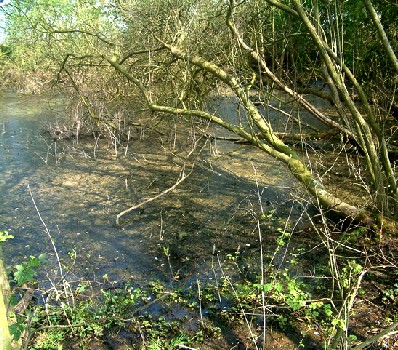
Photo: Mark Walton - A Stagnant Watering Hole
of any particular humor was believed to cause ill health. In addition, the corruption of any humor by heat or cold or similar conditions would make it unwholesome and detrimental to the well-being of the body. Hippocrates warned that standing waters
bring on hoarseness; those who drink them have large and obstructed spleens, their bellies are hard, emaciated, and hot; and their shoulders, collar-bones, and faces are emaciated; for their flesh is melted down and taken up by the spleen, and hence they are slender; such persons then are voracious and thirsty; their bellies are very dry both above and below, so that they require the strongest medicines7
Tryon said standing waters could be "better or worse, according as the season is wet or dry; for in dry seasons they not only become thick and slimy, but awaken a gross fulsome Saturnine [heavy and dull] Quality... that suffocates the pure thin spiritous parts"8. Like Hippocrates, Tryon warns his readers "such Waters are not wholesome for Men nor Beasts."9 Tryon does not couch his comments in terms of the bodily humors, although his writings suggest reasons that correspond to some of Hippocrates works.
Hippocrates has a few things to say about the impact of other types of water on health. Like sea captain Alexander Hamilton's comment in section on bad water, Hippocrates warns his readers about water which have leeched foreign substances from rocks and soil during its travels "such as those having iron, copper, silver, gold, sulphur, alum, bitumen and nitre (soda) in them... [such waters] are hard and of a heating nature, difficult to pass by urine, and of difficult evacuation by the bowels."10
Several other types of water fall in between rain and standing water n terms of goodness for the body according to these author. Tryon puts rain water first, river water second, spring or fountain water third, pump or well water fourth and ponds or standing water last.11 This is similar to a list proposed by another non-medical author, Sir William Vaughan. Vaughan advised:
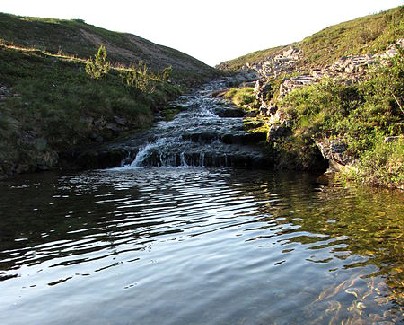
Photo: Wiki User Lakkahillo
"To discerne good waters from bad, you must learne, that there be foure differences of waters, namely, Raine water, River water: fountaine water, and stange [probably standing or stagnant] water."12
As these lists suggest, a key aspect to good water whether it was moving or not. Tryon notes that river water "has the benefit of Motion, with the benevolent Influences of the Sun, and the Element of the Air, which purge it from its harsh earthy Qualities, and as it were open its Body"13. Vaughan suggests that the best water is that which "runneth from an higher to a lower ground" which again suggests water in motion was preferable.14 Hippocrates agreed without explicitly saying so. "The best [waters] are those which flow from elevated grounds, and hills of earth; these are sweet, clear, and can bear a little wine"15.
Between the medical writings of Hippocrates aimed at medical men and those of Tryon directed at housewives, the idea that different types of water impacted health was promoted to various parts of English society.
Despite this advice, most ships seem to have gotten their water from rivers and pools. His Majesty's Ship Bristol in 1678 was anchored at Harwich, England when Chaplain Henry Teonge wrote in his diary "A wett day [refer to rain]; and wee fetch som fresh water from shoare."16 So they ignored the rain and took the casks ashore to get water. While off at Isla Grande off the coast of Brazil in November 21st, 1708, Woodes Rogers recorded, "we got our empty Casks ashore, and sent our Carpenter with a Portuguese to look out Wood for Trusle-Trees; our Main and Fore Trusle-Trees being both broke [trestletrees are a pair of timbers used to support a ship's mast]; but the Weather prov'd so wet and sultry, that we could do little or nothing."17 In other words, it was raining too hard for the sailors to collect water! In fairness, it was probably easier and more reliable to fill a large number of casks from pooled sources than it was to try and collect enough rain. In addition, sailors would be accustomed to water from ground sources and might have preferred it.
1 Hippocrates, "Of Airs, Waters, and Places", The Genuine Works of Hippocrates, Vol. 1, 1849, p. 198; 2 Hippocrates, p. 170; 3,4 Thomas Tryon, The Way to Health, Long Life and Happiness, 1697, p. 100;5 Hippocrates, p. 196; 6 Hippocrates, p. 195-6; 7 Hippocrates, p. 196; 8 Tryon, p. 104; 9 Tryon, p. 105; 10 Hippocrates, p. 197; 11 Tryon, p. 100-4; 12 William Vaughan, Approved directions for health, 1612, p.9; 13 Tryon, p. 101; 14 Vaughan, p. 11; 15 Hippocrates, p. 197; 16 Henry Teonge, The Diary of Henry Teonge, Chaplain on Board H.M.’s Ships Assistance, Bristol, and Royal Oak, 1675-1679, 1825, p. 244; 17 Woodes Rogers, A Cruising Voyage Round the World, 1712, p. 39
Fresh Water and Health - Water Used in Healing
Fresh water is mentioned in conjunction with healing in period accounts. Sea surgeon John Moyle mentions it in conjunction with pedestrian surgical tasks when preparing for battle. "You are likewise to have by you two Tubs with water; the one to throw amputated Limbs into until there is conveniency to heave them over-board; and the other to dip your dismembring Bladders in, or to wash between each Operation, and for other services."1 However, if fresh water were at a premium during a voyage, salt water could presumably be substituted, particularly for the amputation limb bucket.
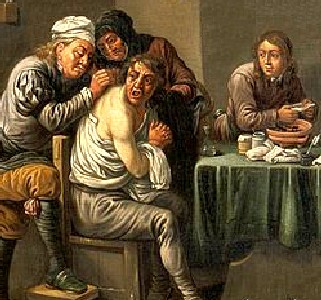
Artist: David Teniers the Younger
A Surgeon at Work, Assistant with Bowl & Bandages (17th c.)
Sea surgeon John Atkins used fresh water when practising several humor-based treatments, although again for relatively mundane tasks. He used warm water to rinse fontanels (wounds made in the skin and then kept open with foreign objects to allow 'laudible pus' to come out).2 He suggests that cold water be employed to help break the suction created by cupping glasses (sealed cups in which vacuum is created and attached over open wounds to draw out unwanted humors).3 Fresh water was also employed to rinse a body part after bloodletting.4
In a similar vein, sea surgeon John Woodall recommends rinsing both the cupping glass and the patient's skin with hot water before applying the cup to provide a good seal.5 He also suggests wetting bandages in water and vinegar when dressing fractures6 and amputated limbs7. He advises having hot water ready during surgeries such as trepanning in preparation for dressing the wound.8
Water also features in the creation of medicines, an art sometimes discussed by sea surgeons in the many prescriptions found in their sea surgery manuals. While a discussion of the details of making medicines is beyond the scope of this article, the sea surgeon's dispensatory will be of interest to those who want to know more.
Various sailors' accounts from the era also mention needing fresh water for ill men. Edward Barlow explained that when sailors were sick, "There they want both fresh meat and drink of all sorts …and [have] nothing to drink but a little fresh water, many times both stinking and dirty, and yet cannot get half enough of it."9
Several other accounts highlight the need for fresh water when treating the ill. In 1673, during a voyage aboard the East Indiaman Unity, Dr. John Fryer reported that "half the Fleet were disabled by Distempers acquired by Salt Meats, and a long Voyage without Refreshments; and must have suffered too for want of Water,
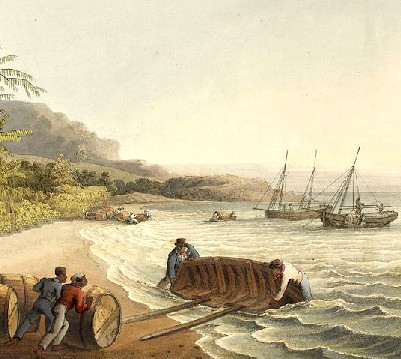
From Ten Views in the Island of Antigua, Plate X (1823)
had not they met with a seasonable Recruit [recent renewal of the supply of water]"10. In 1679, Barlow said the West Indiaman Guannaboe's "master was willing to touch at the island of Barbados, that we might get refreshing for our sick seamen and passengers, it being a more plentiful island than any other we were to pass by or that we could touch at."11 In the same year Chaplain Henry Teonge on HMS Bristol stated "we have little fresh-water, and as little provisions for such a sick ship’s company. God send us a short passage!"12 In 1685, Barlow reported that the East Indiaman Kent entered "the Bay of Karwar [India]; and our men being sickly and our water growing short, and wanting refreshments, we went into Karwar and there anchored and stayed a month"13. Around 1724, Philip Ashton mentioned that the Diamond, a British Man of War "wanting Water, by reason of the Sickness of her men which occasioned a great Consumption of it, had touched here [an island in the Bay of Honduras], and sent in the Brigantine to fetch off Water for her."14
Certain waters were also suggested to have curative powers according to sailors. Woodes Rogers said that the water in the La Plata River in Argentina "is very sweet, clears the Voice and Lungs, and is good against all Rhuems and Defluxions."15 During the same voyage, Dutchess Captain Edward Cooke noted that a river south of Guayaquil, Ecuador passed through an "abundance of Mangroves and Sasparilla; and, on Account of this latter, the Water is accounted good for the Pox [syphilis]."16 Captain Alexander Hamilton similarly advised that the river waters near Atcheen (Acen, Sumatra) "are excellent for bathing. Washing in it before Sun-rising, and after setting, has cured inveterate Fluxes; and I have been told, that frequent Bathing has cur’d the Pox."17
1 John Moyle, Abstractum Chirurgæ Marinæ, 1686, p. 22; 2 John Atkins, The Navy Surgeon, 1742, p. 179; 3 Atkins, p. 181; 4 Atkins, p. 190; 5 John Woodall, the surgions mate, 1639, p. 22; 6 Woodall, p. 152; 7 Woodall, p. 157; 8 Woodall, p. 3; 9 Edward Barlow, Barlow’s Journal of his Life at Sea in King’s Ships, East and West Indiamen & Other Merchantman From 1659 to 1703, p. 214; 10 John Fryer, A New Account of East India and Persia, 1698, p. 16; 11 Barlow, p. 319; 12 Henry Teonge, The Diary of Henry Teonge, Chaplain on Board H.M.’s Ships Assistance, Bristol, and Royal Oak, 1675-1679, 1927, p. 253; 13 Barlow, p. 371; 14 Philip Ashton, Ashton's Memorial, 1726, p. 86; 15 Woodes Rogers, A Cruising Voyage Round the World, 1712, p. 77; 16 Edward Coxere, Adventures by Sea of Edward Coxere, 1946, p. 142; 17 Alexander Hamilton, British sea-captain Alexander Hamilton's A new account of the East Indies, 17th-18th century, 2002, p. 404
Fresh Water and Health - Water Causing Health Problems
Several contemporary authors link health problems to bad water. Sea surgeon John Moyle blamed "Countries where we get abundance of bad Wine and beverage, or are reduced to drink stinking water" for causing a flux (diarrhea).1 When a bunch of the sailors on his ship came down with a fever in Ria Lexa - modern El Realjo, Nicaragua, William Dampier suggested it could have been caused by "the badness of the Water"2. Captain Alexander Hamilton noted that ten days after they loaded
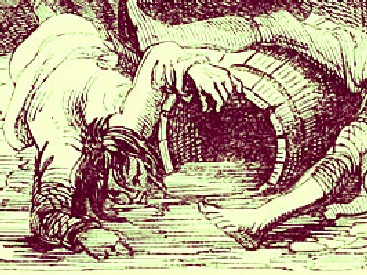
Sick Man By a Barrel, From Master Humphrey's Clock, Vol. 3 (1843)
water from Ilha Verde, Macao into their casks "all my Men were affected with a violent Head-ach, and, among the rest, myself, which was a Distemper I never had been troubled with before."3 Stopping at Horn Island near Batavia/Jakarta (either Pulau Tunda or one of the smaller islands near it) to careen, Woodes Rogers warned, "Many of our Men fell ill of Fevers and Fluxes, occasion’d, as I was inform’d, by their drinking the Water upon the Island."4
When soldier and eventual Pirate John Massey was in charge of building a new Royal African Company fort in Gambia, Africa, he said that the drinking the water there "threw them into strange Fevers and Fluxes: so that instead of building a Fort, he used to see twenty Men at a Time rolling on their Backs in the Pains of Death"5.
Three things are connected to bad water in these texts: headaches, fever and flux (what we would call diarrhea or dysentery). While such things would be called symptoms of a problem today, during this period there was a tendency to identify them as health problems in and of themselves. Headaches and fevers are only mentioned by the above accounts. Both can be symptomatic of waterborne health problems.
Not surprisingly, a couple other accounts associate bad water with diarrhea. While visiting Santa Maria Island off the coast of Mexico, Woodes Rogers noted that the water on one side of the island "purg’d those that drank it aboard the Dutchess like Physick [referring to laxative medicines]."6 In a petition to the King, John Massey, who joined pirate George Lowther for a brief period, complained "they were in Generall seas’d [seized] with a flux w[hi]ch proceeded from eating salt Provisions without any sort of Bread and having nothing to Drink but bad Water" while at Fort James at the mouth of the Gambia River.7
Although these descriptions are too vague to give a meaningful indication of the modern term for the illness suffered,
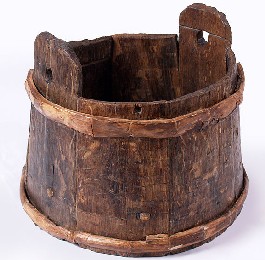
Photographer: Peter Crossman
I'll Let You Guess What This Might Be For - A
Wooden Bucket Recovered from Mary Rose,
A mid-16th Century Carrack Vessel
the variety of waterborne illnesses which existed were almost certainly the same as they are today. The most common such complaint is traveler's diarrhea or traveler's dysentery (TD). This is non-fatal illness caused by bacteria (the most common being E. Coli, Campylobacter Jejuni and Salmonella), which typically lasts about four days to a week. These bacteria thrive in warm environments where the water and food are tainted, particularly by feces. The Center for Disease Control notes that the highest risk areas for TD today are Asia, the Middle East, Africa, Mexico, and Central and South America.8 It is notable that are the places where sailors frequently traveling to during the golden age of piracy.
While unpleasant, traveller's diarrhea is one of the tamer intestinal problems that can result from drinking bad water. The World Health Organization states, "Contaminated water and poor sanitation are linked to transmission of diseases such as cholera, diarrhoea, dysentery, hepatitis A, typhoid and polio. Absent, inadequate, or inappropriately managed water and sanitation services expose individuals to preventable health risks."9

Artist: Peter Lely
Edward Montagu, 1st Earl of Sandwich (1666)
There are a variety of examples of sailors dying from dysentery which may have been caused by bad water, although they pre-date the golden age of piracy. John Hawkyns and Francis Drake both died of what appears to have been dysentery on the same voyage despite having taken extensive precautions to ensure the health of their voyage.10 In an expedition begun in 1595 Robert Davie wrote that a "great sicknes fell among our fleete, and there died about eighty men of the same. This sicknesse was the fluxe of the bellie, which is a common disease in that countrey."11
Closer to the golden age of piracy, Edward Montagu, the first Earl of Sandwich explained how during the second Dutch War, he "had to land a thousand sick and recruit two thousand five hundred men [to make up for the same number dying], a number so much in excess of the recent casualties that we must assume a high mortality among the sick."12 According to historian John Keevil, "We can only infer that, like so many past outbreaks, it was typhus or an intestinal infection caused by water, beer or victuals."13
Another health problem that was frequently (and unfairly) blamed in part on tainted drinking water was scurvy. Three different authors of three different sea accounts around the turn of the 17th century associate bad water (among other things) with scurvy. Dampier left Western Australia in 1699 because his men were coming down with scurvy, which he thought "was promoted by the Brackish Water they took in last [in Australia] for boiling their Oatmeal."14 He similarly noted "our Men began to droop, in a sort of a Distemper that stole insensibly on them, and proved fatal to above thirty who died before we arrived at the Cape [of Good Hope]... [which] might probably arise from the badness of the Water, which we took in at Bencouli [modern Bengkulu City, Sumatra]"15. While he didn't call this scurvy, its sounds very much like it.
William Barlow stated in a 1696 journal entry that because his men were limited to a quart of water 
Artist: Gustav Dore
Taken from Rime of the Ancient Mariner (1876)
per day, "which was but a small quantity to poor men that eat dry biscuit and salt beef boiled in salt water, and in a hot climate, which caused men to fall down upon the scurvy, especially such people as were not used to hardship and had not known the lack of drink."16 Francis Rogers mentioned that during a 1703 voyage his sailors were "just dead with the scurvy and other diseases, with eating nothing but salt provisions and drinking water in these long passages"17.
One of the problems with scurvy was that its true cause was not understood. In reaching for a reason for its appearance amongst a crew, a wide variety of things were blamed before the true cause was positively identified by James Lind in the mid-18th century. Yet none of the three English sea surgeon authors from around this time - John Woodall, John Moyle and John Atkins - suggest that water was the cause of scurvy. One has to go all the way back to William Clowes, who practised for a period at sea in the mid and late 16th century, to find an English medical source for this notion.18 Ideas apparently had long lives at sea.
There was one waterborne illness that was correctly identified by the author of a sea account. Captain Alexander Hamilton, whose book actually contains a number of factual errors, correctly noted that people "who are obliged to drink of the Wells near the town [of Mocha, Yemen] are in Danger of having a long small Worm breed in their Legs or Feet, that inflames the Place where it breeds, which is accompanied with extreme burning Pains."19 This health problem is today called Dracunculiasis or Guinea-worm disease. Just as Hamilton describes, people are infected by drinking water which contains water fleas that are infected with guinea worm larvae. A detailed description of this problem and its period cure appear in the article on parasites.
Hamilton also said that the water around 'Couchin' (Kochi, India)
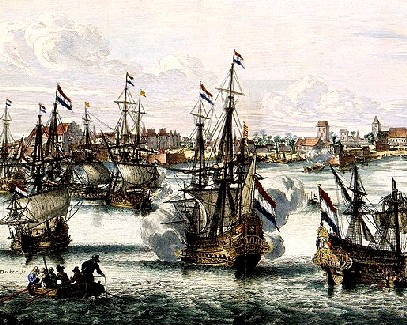
Artist: Coenraet Decker
Capture of Cochen by the Dutch in 1656, From Atlas Van der Haven (1682)
"has a bad Quality of making the constant Drinkers of it have swell'd Legs. Some it affects in one Leg, and some in both. I have seen Legs above a Yard about at the Ancle, it causes no Pain, but itching"20. He goes on to explain that because of this, the Dutch sent boats laden with 'small portable Casks of 10 or 12 English Gallons' to retrieve water from Verapoly. "[A]nd yet, for all that Precaution, I have seen both Dutch Men and Women troubled with that Malady. And no Cure has been yet found to heal or prevent it."21
Perhaps his most interesting comment on the healthiness of the local water comes from Hamilton's discussion of the Dutch colony at Nagapatam (today called Nagapattinam) in India. According to Hamilton the garrison there was so unhealthy that in 1693 'Commissionary General for Affairs of the Dutch East India Company Myn Heer Van Reede' removed the cause of the malady by building water boats to bring water from a location 4 leagues (about 14 miles) away. (This is almost certainly Hendrik Van Rheede, charged with inspecting the Dutch East India outposts in 1684. He died in 1692, so Hamilton has at least some of his facts wrong.) Hamilton goes on to explain the results: "In a short Time there was a visible Alteration for the better in the State of the Inhabitants Health, and making an Estimate of the Charges of those Water Boats, and the usual Charges of the Hospital, the Company found that they gained by the Water Boats."22
1 John Moyle, Abstractum Chirurgæ Marinæ, 1686, p. 100; 2 William Dampier, A New Voyage Round the World, 1699, p. 224; 3 Alexander Hamilton, British sea-captain Alexander Hamilton's A new account of the East Indies, 17th-18th century, 2002, p. 487; 4 Woodes Rogers, A Cruising Voyage Round the World, 1712, p. 397; 5 Select and Impartial Accounts of the Lives, Behavior, and Dying-Words Of the most Remarkable Convicts, Vol. II, 1745, p. 13; 6 Rogers, p. 269; 7 “28. The petition of John Massey and George Lowther, from EXT 1/261, ff. 197-199", Pirates in Their Own Words, Ed Fox, ed., 2014, p. 130; 8 Bradlley A. Connor, "Traveler's Health: Chapter 2: Traveker's Diarrhea", cdc.gov, gathered 6/18/17; 9 "Drinking-water Fact sheet". www.who.int, gathered 6/19/17; 10 John Keevil, Medicine and Navy, Vol. 1, 1957, p. 109; 11 Keevil, Vol. 1, p. 107; 12,13 John J. Keevil, Medicine and the Navy 1200-1900: Volume II – 1640-1714, 1958, p. 87; 14 William Dampier, A New Voyage Round the World, Vol III, Part II, 1703, p. 10; 15 William Dampier, A New Voyage Round the World, 1699, p. 524; 16 Edward Barlow, Barlow’s Journal of his Life at Sea in King’s Ships, East and West Indiamen & Other Merchantman From 1659 to 1703, p. 462; 17 Francis Rogers, "The Journal of Francis Rogers", Three Sea Journals of Stuart Times, Bruce S. Ingram ed., 1936, p. 192; 18 William Clowes, Selected Writings of William Clowes, 1948, p. 84-5; 19 Alexander Hamilton, British sea-captain Alexander Hamilton's A new account of the East Indies, 17th-18th century, 2002, p. 49-50; 20,21 Hamilton, p. 328; 22 Hamilton, p. 347-8

